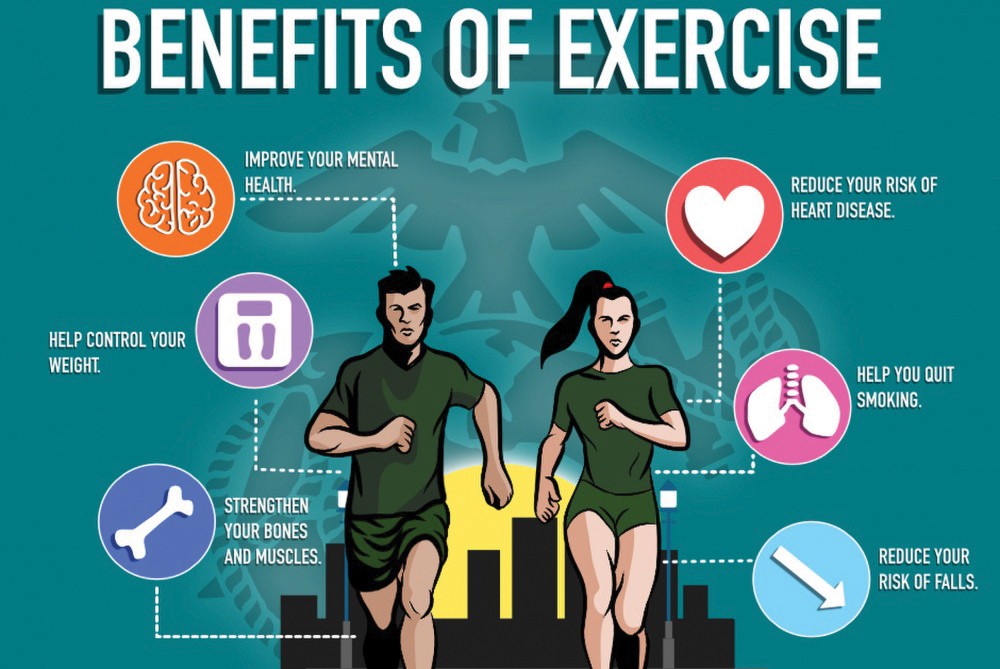In today’s fast-paced world, maintaining a healthy lifestyle has become increasingly important. Exercise plays a pivotal role in achieving overall well-being. Whether you’re looking to enhance physical fitness, boost mental health, or improve quality of life, regular physical activity offers numerous benefits. This article explores the benefits of exercise and provides insights into how incorporating a fitness routine can transform your life.
Physical Benefits of Exercise
Improves Cardiovascular Health
Engaging in regular exercise strengthens the heart, improves blood circulation, and lowers the risk of heart diseases. Activities like running, swimming, and cycling enhance heart health by increasing the efficiency of oxygen delivery to the body.
1.2. Aids in Weight Management
Exercise is a critical component of weight management. Aerobic activities burn calories, while strength training builds muscle, which increases metabolism. This dual approach makes it easier to achieve and maintain a healthy weight.
1.3. Enhances Muscle Strength and Bone Health
Resistance exercises, such as weightlifting and bodyweight training, boost muscle strength. They also stimulate bone growth, reducing the risk of osteoporosis, particularly in older adults.
1.4. Improves Flexibility and Balance
Practices like yoga and Pilates enhance flexibility and balance. Improved flexibility reduces the risk of injuries, while better balance is essential for daily activities and aging gracefully.
1.5. Strengthens the Immune System
Regular physical activity enhances the immune system by promoting better circulation, which allows immune cells to function more effectively. A robust immune system means fewer illnesses and quicker recovery times.
Mental Benefits of Exercise
2.1. Reduces Stress and Anxiety
Exercise triggers the release of endorphins, also known as “feel-good” hormones. These chemicals help combat stress and reduce anxiety levels, leaving you feeling relaxed and rejuvenated.
2.2. Boosts Mood
Physical activity is a natural mood enhancer. Studies show that regular exercise can significantly reduce symptoms of depression and improve overall happiness.
2.3. Improves Sleep Quality
Struggling with sleep issues? Exercise can help. Physical activity promotes deeper and more restful sleep by regulating your body’s circadian rhythm.
2.4. Enhances Cognitive Function
Exercise improves blood flow to the brain, which enhances memory, focus, and learning capabilities. It is particularly beneficial for older adults in reducing the risk of cognitive decline and diseases like Alzheimer’s.
2.5. Builds Resilience
Regular workouts teach discipline and resilience. Over time, this mindset spills over into other areas of life, helping you tackle challenges more effectively.
Social Benefits of Exercise
3.1. Encourages Social Interaction
Group fitness classes, sports teams, and running clubs provide opportunities to meet new people and build relationships. Social interaction is essential for emotional well-being.
3.2. Boosts Teamwork Skills
Participating in team sports fosters collaboration and teamwork. These skills are not only vital on the field but also translate to professional and personal life.
3.3. Creates a Sense of Community
Joining a fitness group or gym creates a sense of belonging. Being surrounded by like-minded individuals who share similar health goals can motivate you to stay committed
Long-term Health Benefits of Exercise
4.1. Reduces Risk of Chronic Diseases
Regular physical activity lowers the risk of chronic illnesses such as type 2 diabetes, hypertension, and certain types of cancer. It also helps manage existing conditions by improving overall health.
4.2. Promotes Longevity
Studies indicate that active individuals tend to live longer than those who lead sedentary lifestyles. Exercise reduces mortality rates by minimizing the risk of life-threatening diseases.
4.3. Enhances Skin Health
Sweating during exercise promotes detoxification, while increased blood flow nourishes skin cells. This combination results in a glowing complexion
Psychological Growth Through Exercise
5.1. Builds Self-confidence
Achieving fitness milestones, such as running a 5K or lifting heavier weights, boosts self-esteem and fosters a sense of accomplishment.
5.2. Encourages Goal Setting
Exercise encourages setting and achieving goals. Whether it’s completing a marathon or mastering a challenging yoga pose, these accomplishments inspire personal growth
Tips to Incorporate Exercise Into Your Daily Routine
6.1. Start Small
Begin with short workouts and gradually increase intensity and duration. This approach prevents burnout and ensures consistency.
6.2. Choose Activities You Enjoy
Whether it’s dancing, hiking, or swimming, engaging in activities you love makes exercising fun rather than a chore.
6.3. Set Realistic Goals
Define achievable fitness goals to stay motivated. Celebrate small victories to maintain enthusiasm.
6.4. Incorporate Exercise Into Daily Life
Take the stairs instead of the elevator, walk or bike to work, and engage in household chores to stay active throughout the day.
6.5. Stay Consistent
Consistency is key to reaping the long-term benefits of exercise. Aim for at least 150 minutes of moderate aerobic activity per week, as recommended by health experts
Overcoming Barriers to Exercise
7.1. Lack of Time
Opt for high-intensity interval training (HIIT) workouts that deliver maximum benefits in minimal time.
7.2. Limited Budget
Exercise doesn’t have to be expensive. Bodyweight exercises, running, and free online workout videos are cost-effective options.
7.3. Physical Limitations
Individuals with physical constraints can engage in low-impact activities like swimming or chair exercises, tailored to their needs.
Benefits of Exercise for Specific Groups
8.1. Children
Exercise supports physical development, enhances concentration in school, and promotes social skills through team sports.
8.2. Adults
For adults, exercise helps manage stress, maintain a healthy weight, and improve work productivity.
8.3. Seniors
In older adults, physical activity preserves mobility, reduces the risk of falls, and enhances mental health.
Exercise and Nutrition: A Winning Combination
To maximize the benefits of exercise, pair it with a balanced diet. Proper nutrition provides the energy and nutrients needed to fuel workouts and aid recovery.
Conclusion
The benefits of exercise extend far beyond physical fitness. From improving mental health to fostering social connections and enhancing longevity, the positive impact of regular physical activity is undeniable. Regardless of age or fitness level, incorporating exercise into your daily routine is one of the best investments you can make for your overall well-being.
Start small, stay consistent, and remember that every step you take toward a more active lifestyle brings you closer to a healthier, happier you.
